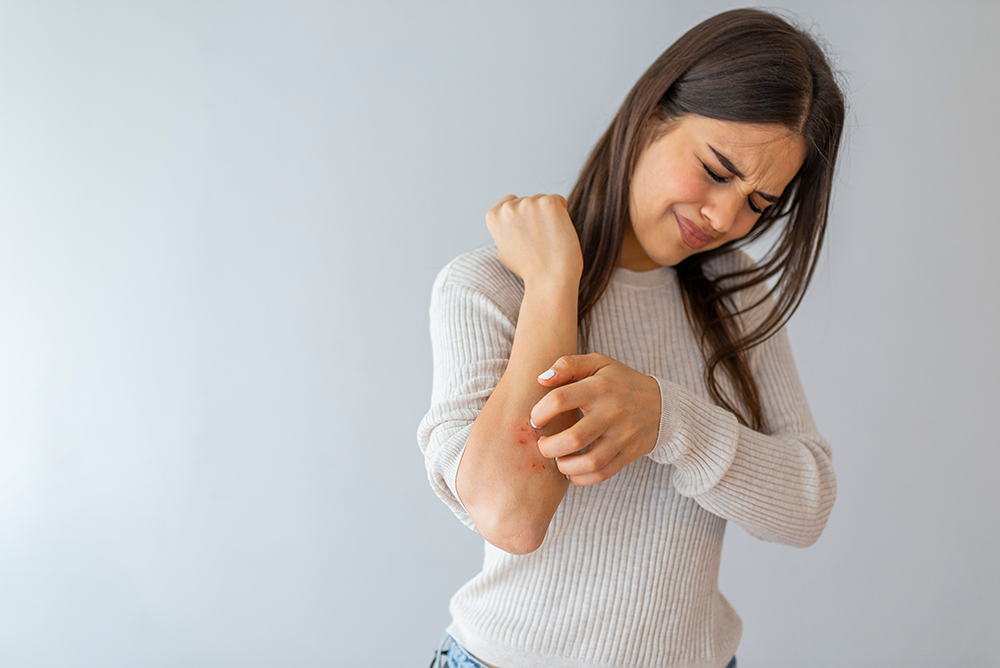There are numerous reasons why skin can become itchy. It may indicate a reaction to irritating chemicals in cosmetics and other items, an allergic reaction, an insect bite, a skin ailment such as psoriasis or eczema, or a reflection of hormonal changes that occur during pregnancy.
Itchy skin might hurt for some people, and cause rashes or hives for others.
Itchy skin may usually be treated at home and is not a dangerous condition.
This post will discuss when to visit a healthcare professional, as well as 12 efficient at-home treatments to help reduce itchy skin.
Prevent Triggers of Itch
Doing your best to avoid or counteract those triggers might help you prevent itchy skin from forming if you are aware of what might cause it (triggers include things like eating specific meals, wearing dry air, severe temperatures, or bug bites).
Use a humidifier to add moisture to your indoor air and moisturize your skin with a gentle moisturizer to help you avoid the discomfort of itchy skin during that time of year, for example, if you know that the colder temperatures and drying effects of indoor heating trigger your eczema.
Apply coconut oil
The natural antimicrobial and antibacterial qualities of coconut oil have been demonstrated to eradicate the bacteria that causes inflammatory acne, but only in laboratory settings—human studies have not confirmed these effects.
According to more research, virgin coconut oil may be able to treat persons with mild eczema also known as atopic dermatitis, who are experiencing skin irritation.
But some people could find coconut oil irritating or allergic to it.
Consult your healthcare professional for advice if you’re not sure whether to use coconut oil for your irritated skin, and always perform a patch test on a tiny portion of your body before applying to the full region.
Have Baths with Oatmeal
To alleviate dry, itchy skin, mix some colloidal oatmeal with some lukewarm water and add to your bath.
Apply moisturizer all day
When you moisturize your skin frequently throughout the day, you can help keep it from drying out and becoming irritated.
Use a moisturizer made specifically for sensitive skin if you have sensitive skin (e.g., a moisturizer without additional fragrance).
After taking a bath or shower, moisturizer should be applied because your pores are more open and responsive to it.
Use gentle cleaners instead
Itchy and painful skin may also be relieved and prevented by switching to gentle cleansers, fabric softeners, and laundry detergents.
Choose fragrance-free, water-based products for your lotions and soaps. It might also be beneficial to use fragrance-free detergents made for delicate skin.
Use a cream with a honey basis
Honey may help reduce microorganisms on the skin and relieve itchy skin disorders, according to a relatively small number of studies.
Although there are honey-containing lotions that can be tested, regular honey is too sticky to apply to significant parts of the body.
You should be informed that additional research is necessary to validate the advantages of honey for itch-causing skin disorders.
Make Use of a Humidifier
Utilizing a humidifier can assist in restoring moisture to your surroundings if the itching is brought on by or affected by dry air.
When indoor heating can dry up your skin, using a humidifier can be especially beneficial in the winter.

Use cold compresses
Your skin’s irritation and inflammation can be lessened by applying an ice pack, washcloth, or cold compress to it.
Keep Up a Good Skincare Schedule
Maintaining a good skincare regimen will help prevent the uncomfortable symptoms that come with having dry, sensitive, and itchy skin.
Putting this into reality means avoiding irritating materials and/or products and making sure your skin is hydrated with a light, fragrance-free moisturizer, especially after taking a bath or shower.
Use over-the-counter antihistamines
The itchy skin associated with eczema can be relieved by over-the-counter (OTC) antihistamines such as cetirizine (Zyrtec), loratadine (Claritin), and diphenhydramine (Benadryl).
Everyday usage of non-sedating long-acting antihistamines such as cetirizine and loratadine is possible.
Put on Airy Clothes
Wearing breathable clothes can help prevent your skin from being too hot or sweaty. Clothing made of natural materials, such as cotton, can also assist.
Selecting breathable clothing for the gym and the warmer months can be very beneficial in avoiding skin irritation or itching.
Don’t scratch yourself
While it might not always be feasible to refrain from scratching when your skin irritates, persistent scratching can break the skin, which can result in bleeding and infections.
Avoiding scratches as much as possible will help keep irritated skin from getting worse.
If you can’t completely stop scratching, you can minimize further skin damage by wearing cloth over the areas of your skin that itch and keeping your nails short.
When to Consult a Medical Professional
Skin irritation is typically not dangerous and easily treatable at home.
However, get in touch with your provider for assistance if your itching is extreme, doesn’t go away after three weeks, or has no obvious or recognizable explanation.
The following other symptoms also call for more urgent medical attention:
Inconvenient or itchy skin that interferes with sleep
Intense discomfort on the skin
Alterations in the look of the skin




